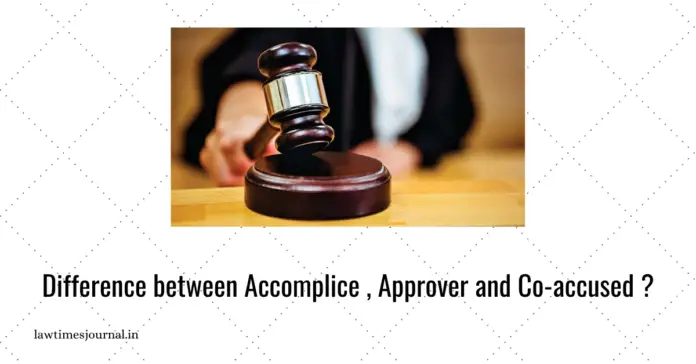
Accomplice:
An accomplice is a person who has taken part in the commission of a crime along with others. When an offence is committed by more than one person then everyone participating in the commission of such offence is an accomplice. Section 133[1] of the Indian Evidence Act defines accomplice.
Accomplice is neither defined nor used in the Criminal Procedure Code but is usually applied to a person, supposed to be directly or indirectly concerned in or privy to an offence to whom a pardon is granted under Section 306[2] of the Code with a view to secure his testimony against another person guilty of the offence.
According to the Black law’s dictionary, the term “accomplice” is defined as ‘one so connected with the crime that at common law he might in self have been convicted either as principal or as an accessory before the fact’. In criminal law, a person who knowingly, voluntarily and with common intent unites with the principal offender in the commission of a crime.[3] The term also includes ‘particeps criminis’ that is a partner in crime.
In the case of Jagannath v. Emperor[4], the court held that ‘a person who is guilty or a partner in crime or in one or the other way connected with the offence or has some material fact that supports he was a part of crime is said to be an accomplice.
Also, in the case of Kashmira Singh vs State of Madhya Pradesh, the Supreme court held that if the judge has taken great caution then he can convict the co-accused purely on the basis of the accomplice evidence.
Approver:
The Criminal Procedure Code, 1973 or the Indian Evidence Act,1872 does not define the term, Approver. But Black laws dictionary defines approver as, ‘ an accomplice in crime who accuses others of the same offence, and is admitted as a witness at the discretion of the court to give evidence against his companions in guilt. He is vulgarly “king’s evidence”.’ ‘One who confesses himself guilty of a felony and accuses others on the same trying to save himself from punishment’[5]
Case law:
In the case of Suresh Chandra Bahri V. State of Bihar[6], The supreme court observed that the approver evidence does not differ from the evidence of any other witness but except his evidence is looked up with great suspicion. In the event of the suspicion that is attached to the evidence of an accomplice will not be removed if his evidence could not be acted upon unless corroboration in particular material. But where in case if the suspension is removed and if the evidence after approval is found to be trustworthy and acceptable then success in evidence may be accepted even without corroboration.
But there are cases where the person is convicted on the basis of evidence given by the Approver.
In the case of Janendranath Ghose V. State of West Bengal[7], the court held that the accused was convicted for murder and was found guilty by the evidence given by the approver.
Co-Accused:
The other persons who are charged on information with the other are the Co-Accused. Enjoying defenses for conspiracy cases is the confession of co-accused can be used as evidence against them but the general rule is that evidence of the who accused should not be considered because such evidence this tainted as he was corroborator in the commission of a crime.
But, According to Section 30 of the Indian Evidence Act,1872 the confession which is proved already in the court can affect the person or affect another person who was involved in the case. If the confession is made for both those involved in the case but the statement is given only by one person, then in such a case the person who confesses will be taken by the court of law. Also, when two or more persons are tried jointly for the same offence one of them makes a confession that affects himself or others the court can take into consideration such confession not only against the person who confessed but also against the others.
Case law:
The Supreme Court in the case of Karishma Singh vs. the state of Madhya Pradesh[8] said that the confession of an accused cannot be used as a substantive piece of evidence against co-accused. The principle is that where there is evidence against the co-accused which is sufficient and if the court believes to support his conviction, then confession of co-accused described under Section 30 of the evidence act may be used as an additional reason for believing that evidence.
Difference between accomplice, co-accused and approver:
- The accomplices can give evidence on oath but the co-accused does not give confession on oath.
- Accomplice evidence is given before the court but the confession of accused may be before any person except police.
- Accomplice evidence can be tested by cross examination whereas the co-accused cannot be tested by cross examination.
- Conviction can be based purely on the accomplice evidence but there can be no conviction completely based on the confession of the co-accused.
- Approver can be regarded as an accomplice but accomplice cannot be regarded as an approver.
[1] Accomplice:- An accomplice shall be a competent witness against an accused person, and a conviction is not illegal merely because it proceeds upon the uncorroborated testimony of an accomplice
[2] https://indiankanoon.org/doc/122405/
[3] People v. Bolanger,71 Cal.17,11 Para 799
[4] Jagannath v. emperor 30 Jan 1920
[5] Myers v. People, 26 Ill,175
[6] Suresh Chandra Bahri V. State of Bihar AIR 1994 SC 2420.
[7] Janendranath Ghose V. State of West Bengal 1959
[8] Karishma Singh V. State of Madhya Pradesh 1952 SC 159








